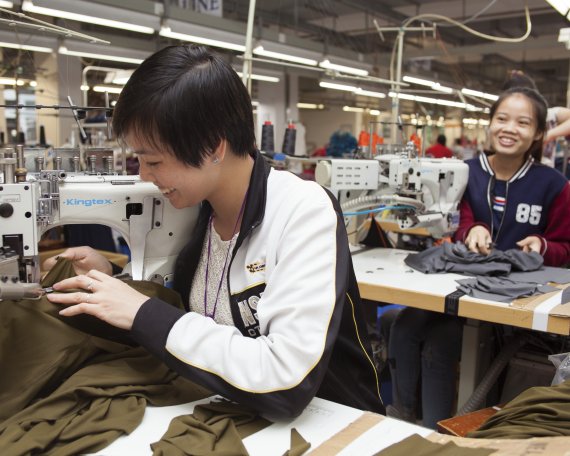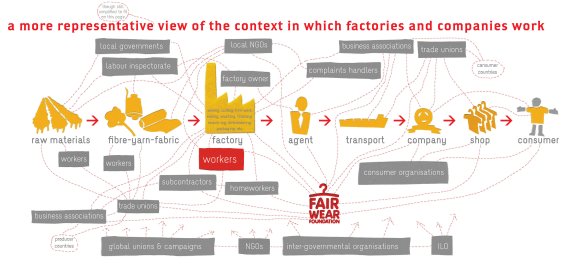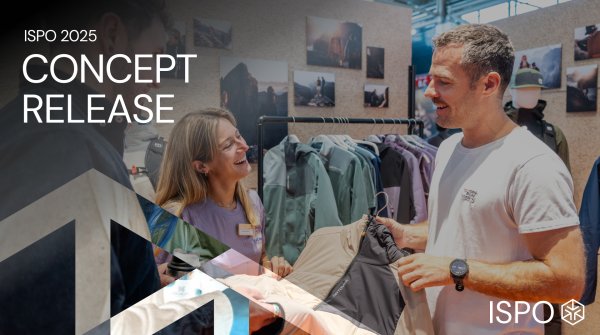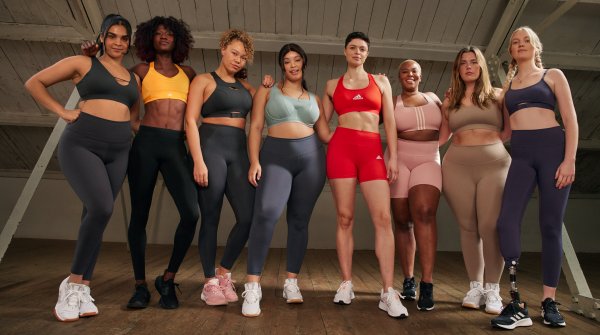
For years, consumers have been asking the clothing industry to improve the production conditions of their suppliers in the Far East. The sports sector is no exception. And for years, industry has been praising improvement. How good are the conditions now? In which areas have progress been made - where are the deficits? The Fair Wear Foundation (FWF), founded in 1999 and headquartered in Amsterdam, is one of the leading European players in improving working conditions in the global clothing and textile industry.
The FWF works with brands, factories, trade unions, NGOs and sometimes governments to verify and improve working conditions in 11 producing countries in Asia, Europe and Africa. It monitors the progress of its 80 member companies and 120 brands and promotes the exchange of expertise, social dialogue and the effectiveness of corporate efforts. ISPO.com spoke to Lotte Schuurman, spokesperson of the FWF, about the successes achieved so far and other goals.
ISPO.com: Outdoor brands belong to the most advanced companies at FWF – why?
Lotte Schuurman: What’s remarkable is the ambitious level of our outdoor brands. They really want to be in our Leader category and if they already are, the score after the next Brand Performance Check should be higher than last year or at least higher than the other FWF brands. That is friendly competition by the way: they help each other a lot; exchanging tools, sharing audits, remediating together and have regular meetings and roundtables.
They actively cooperate in realizing improvements in shared factories. They are also working on innovative ways to implement living wages and tackle excessive overtime. And they might have a better chance to succeed in this than brands in other sectors; they often need high quality products, thus they invest in long term relationships with their suppliers. This doesn’t apply to all of their suppliers off course, but overall more often than with most fashion brands.

FWF was founded in 1999 – looking at the past, where has been achieved the biggest progress?
I think it’s great that more and more FWF members gain good insight into their supply chains and consolidate them more. Lots of FWF members have taken substantial steps in establishing sustainable relations with their suppliers and working together with them on improved conditions. They know the risks and do much better due diligence.
More and more people are aware of obvious problems in the industry like child labour and low wages. But there are also a lot of structural problems on the brands’ side. FWF brands improved their systems, like production planning and calculating prices. They have a proper due diligence process when they select factories and new countries. All very valuable changes that need to be made in order to change the industry in a more sustainable way.
Next to that, we are proud to have developed some valuable tools that help brands to take substantial steps towards better labour conditions, like the Brand Performance Checks to check which steps brands have taken towards better conditions like reducing overtime and paying higher wages. It gives our brands a much better insight on what issues they need to address and consumers can check how well their favorite brand performs.
Also, we receive more and more complaints through our FWF complaints helplines. That means that workers dare to speak up about their problems. When garment workers feel that their rights are being violated, or when others see this happen, they can report their complaint. FWF immediately launches an investigation and requires the brand to work with the supplier to remedy the problem. FWF publically reports on the progress of resolving complaints.
Where are the biggest problems?
In every garment producing country you can encounter problems in factories. The risks are bigger in factories that are not owned by brands - which is nowadays the case in most supply chains - and in places where there are no functioning unions and local institutions to address workplace violations.
However, in general you can say that locations do matter. Brands need to be aware of the risks in certain countries and respond to that. In Turkey for example, the Syrian refugees’ crisis has also caused enormous problems in the garment industry. In Bangladesh Fire & Safety problems in garment factories are very common and in Myanmar for example, child labour is one the biggest challenges.
Living wages have been your concern for a long time. Are there any companies you know where living wages are actually paid?
You are right. Living wages is one of the spear points in FWF’s work. On both factory- and brand level a lot of attention is being paid to this labour standard. And yes, there are garment factories that supply our brands, who pay a living wage. The most recent Best Practice award was actually won by Schijvens. This Dutch workwear brand managed to establish a living wage at their supplier in Turkey.
Also, Continental Clothing is one of the frontrunners on innovative Living Wage projects. Have you seen the video about their clothing line labeled ‘Fair Share’? Their T-shirts and sweatshirts carry a price premium that is directly passed to the garment workers in India to raise their monthly wages.
Why is it so hard to establish a ‘living wage’?
At FWF, we are working carefully to ensure that we support an enabling environment for collective bargaining around wages. At the end of the day, strong industrial relations systems are the only hope for sustainable wage increases. Yet implementing living wages is not always straightforward. In principle, determining wage levels should be done by businesses and trade unions together. But there are very low levels of unionization in the global garment industry.
This - combined with what are usually long supply chains between a brand and the factories where products are made - can make it challenging to get the money to the workers. Also, most factories produce for numerous brands, which can raise complicated questions about responsibility amongst brands for covering wage increases.
FWF has established a Living Wage Incubator. In this group, FWF is challenging its members to take real action to raise wages for the workers who make their products, something that is highly needed and can’t wait! Participation in the Incubator means a brand has committed to take real action to raise wages, instead of just talking about it. The Incubator is designed to help brands take very practical steps to push past the roadblocks standing in the way of living wage implementation. We are working with them, factories and workers to answer key questions like ‘how much more do living wages actually cost?’ and ‘how do we ensure that wage raises actually reach workers?’ Until now, the garment industry has lacked solid answers to these questions.

How do you determine the right wage level? What experiences do you have?
In short, receiving a living wage means that workers can meet their and their families’ basic needs - such as food, shelter, transport, clothing, education for their children, health care, and some discretionary income.
For FWF, the best way to determine the actual wage workers should receive it through fair negotiations between businesses and trade unions. Unfortunately, trade union membership is very low in the global garment industry. So such negotiated wages do not happen very often.
Living wage discussions today are still largely focused on the measurement question: for any given location, what is a fair and reasonable living wage? What exactly gets included in living wage calculations and who should be doing the measurement? Progress on wages has often stalled in these discussions. For FWF, there is the real danger that the implementation of living wages gets waylaid by such discussions. While there is indeed value to finding consistent methods for calculating wage levels, these questions shouldn’t prevent brands from working towards raising wages. Because what we know for sure is that the wages in most garment producing countries are way too low to live off.
That is why FWF bypasses this discussion ‘What is a living wage?’ by asking local stakeholders to provide living wage estimates and showing these as benchmarks in our Wage Ladder; we visualize the steps that can be made towards living wages together with our member brands. The industry does not need to wait for an international standard to be developed.
You can start moving wages ‘up the ladder’ today. The system may not be perfect yet, but more than getting the numbers exactly right, it is important to actually get out there and try. And ensure workers receive more as soon as possible. FWF’s wage ladder was designed to help workers, factory managers, and brands in the process of setting target wage levels in factories and beyond.
Overtime is also a challenge maybe even more in the sports industry because we still have 2 seasons and no year-round production. What are you suggesting to improve that?
Many improvements can also be made at the brand’s side, for example by using a realistic production planning in close cooperation with the factory. Amongst them they should agree a sensible timeline. Excessive overtime in sewing factories is often the direct result of customers ordering their garment late or making changes too late in the process. Take a look at this video LINK6 of FWF brand Deuter to see how they dealt with overtime at one of their suppliers in Vietnam.
In the meantime more and more companies are going to Africa to produce there. What are the conditions there? Which countries are problematic, which are not?
FWF only works in Tunisia. One of the most common findings in FWF audits there is that workers are not aware of their labour rights. Complaints handling systems are not functioning well, and workers don’t have access to remedy. FWF has a local audit team and complaints handler in Tunis. FWF found many cases where worker committees did not exist or were not active, even though they are a legal requirement.
At the same time, at least in the EU, more and more is being talked about automation and about the fact that production can be relocated back to the EU. How do you see that?
We closely follow these discussions – both our country managers in The Netherlands and our local country colleagues in the productions countries.
For outdoor brands the choice in factories might be a bit more limited than for other brands, since they use more advanced technologies to produce garments. FWF outdoor brands are very much committed to long term relationships with their suppliers so they will think twice before they leave their supplier for another one. To compensate wage increases, many production companies invest in more efficiency and better machines. This topic is much discussed in the FWF Living Wage Incubator.
- ISPO awards
- Mountain sports
- Bike
- Design
- Retail
- Fitness
- Health
- ISPO Job Market
- ISPO Munich
- ISPO Shanghai
- Running
- Brands
- Sustainability
- Olympia
- OutDoor
- Promotion
- Sports Business
- ISPO Textrends
- Triathlon
- Water sports
- Winter sports
- eSports
- SportsTech
- OutDoor by ISPO
- Heroes
- Transformation
- Sport Fashion
- Urban Culture
- Challenges of a CEO
- Trade fairs
- Sports
- Find the Balance
- Product reviews
- Newsletter Exclusive Area
- Magazine






